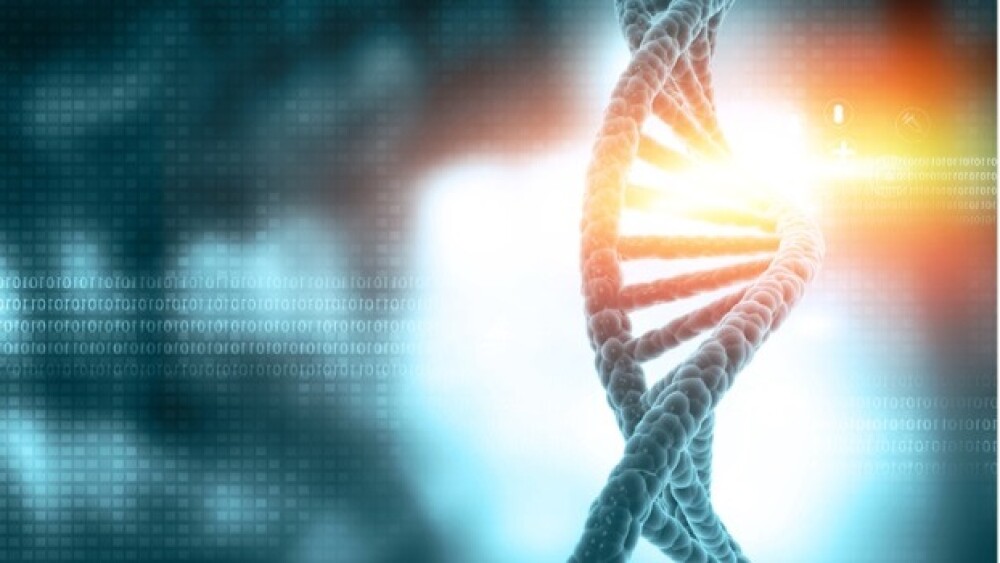Two children with relapsed T cell acute lymphoblastic leukemia were cleared of cancer while a third died from fungal infection, according to research published Wednesday in The New England Journal of Medicine.
Pictured: DNA strand on background of binary code/iStock, Rasi Bhadramani
Last May, a 13-year-old girl was the world’s first patient to receive base-edited T cells for her incurable T cell leukemia. Since then, two more children have been treated and results were published in The New England Journal of Medicine on Wednesday.
While two of the patients’ leukemias were cleared by the edited cells and they went on to bone marrow transplantation, the third experienced serious complications. A fungal infection typically harmless to healthy individuals infected the patient. Due to the immunosuppression involved in the CAR T therapy, his body was unable to fight the infection and he died.
Acute lymphoblastic leukemia is the most common childhood malignancy. T cell ALL (T-ALL) accounts for 10% to 25% of all cases and is fairly curable with an overall survival rate around 80% with conventional treatments. However, when T-ALL relapses in up to 25% of children, the prognosis is much poorer, with a 30% to 50% chance of survival.
All three of the patients in the trial had relapsed T-ALL.
The trial was a “bench-to-bedside” collaboration between University College London (UCL) and Great Ormond Street Hospital (GOSH) for Children in London. Researchers utilized healthy donor T cells to create an accessible bank of universal anti-T cell chimeric antigen receptor (CAR) T cells. The changes made to the cell were done through base-editing, a process which chemically converts a single letter of the DNA code.
The base-editing approach avoids cutting the chromosomes and “works really well for engineering T cells,” Waseem Qasim, professor of cell and gene therapy at the University College London, told News Medical Life Sciences. By not making a cut to the chromosomes, base editors are expected to be safer and more efficient than other types of gene editing platforms.
In the study, existing receptors were removed from the T cells to make them universal. The identifier CD7 was then removed to prevent the T cells in the body from killing each other. A second identifier, CD52, was also deleted to help the edited cells evade the drugs given during treatment.
Finally, scientists added a CAR that recognizes the CD7 T cell receptor in the leukemia cells. This armed the cells to fight the children’s blood cancer.
The treatment cleared the patients’ leukemia within about four weeks of receiving the cells. The two went on to receive a successful bone marrow transplant afterwards and were able to go home.
What’s Next
The UCL GOSH trial is still open for up to 10 National Health Service patients who’ve exhausted all conventional treatments. If it continues to be successful, the team hopes to open it to even more children and make it available for adults in the future.
“The technology itself could also have wide reaching applications for corrections of certain inherited conditions such as sickle cell disease,” Qasim said. “As the technology matures and is shown to be safe, it could be applied quite widely, although there will need to be careful testing and longer-term studies.”
Meanwhile, Beam Therapeutics is advancing its own base-editing technology. Specifically, the company plans to dose the first patient with its anti-CD7 CAR T candidate (BEAM-201) for relapsed/refractory T cell acute lymphoblastic leukemia/T cell lymphoblastic lymphoma this summer.
The burgeoning field comes with a lot of questions, evidenced when the FDA placed a clinical hold on BEAM-201, requiring more information regarding genomic rearrangement and off-target effects. The hold has since been lifted.
Kate Goodwin is a freelance life science writer based in Des Moines, Iowa. She can be reached at kate.goodwin@biospace.com and on LinkedIn.






